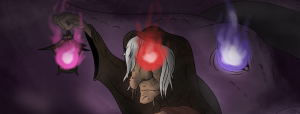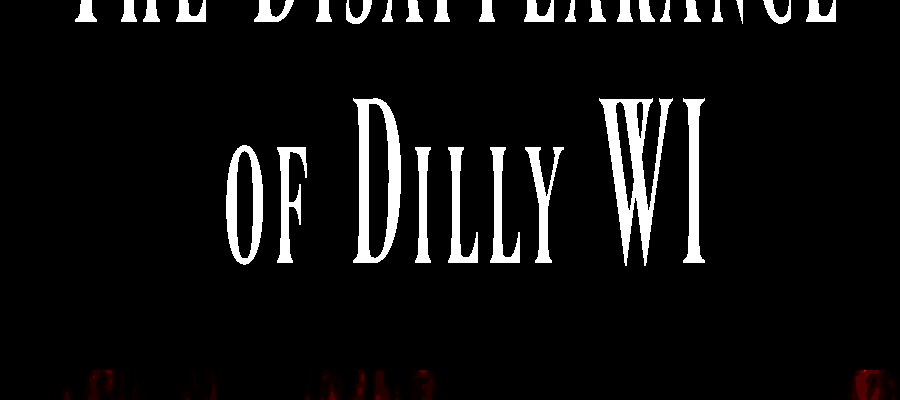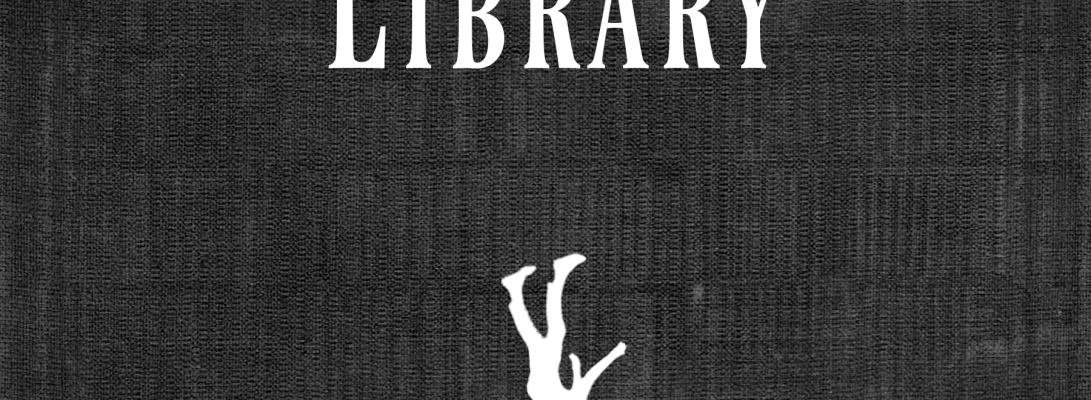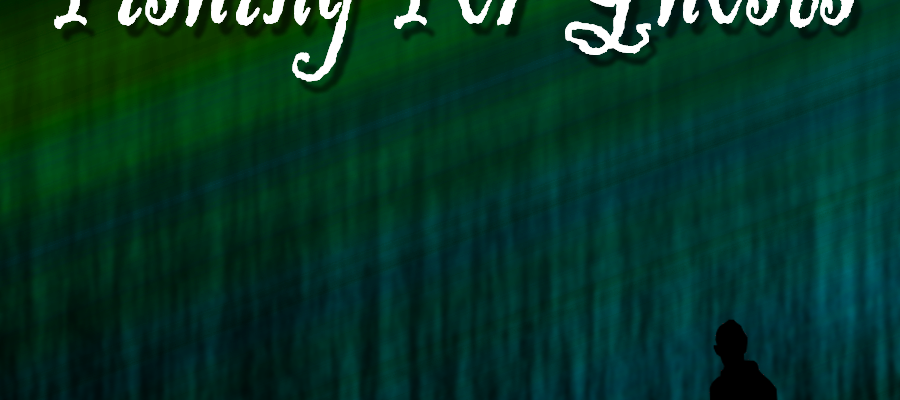A man sits at his desk, stooped over a leather-bound journal. His posture is stiff, his eyes fixed on his work. What was once a nice suit drapes loose upon his body, shrapnel-stained and coated with ink. The man is a writer. He is, however, a clumsy penmanship, too eager, too jittery. Too on the verge of falling apart. He can barely read his own words. He would prefer to use a computer or tablet or text-to-speech, but he knows better—knows that to change the world, his Bible must be written by hand.
A second man steps out of the shadows. He floats to the first as a phantom of torn coats and wide-brimmed hat, and in one fluid motion, produces a gun. He presses the barrel to the back of the first man’s head.
It is raining outside.
“Mr. Carver,” the second man says. His gun shakes. His hand is covered in fresh wounds. One of his fingernails is missing. “John. It’s time to put the pen down.”
“I’m almost done,” John says. He sounds far away.
“I know.”
And I walked naked through that liminal space, my arms outstretched to part the before from the after, all breath stopped in forever anticipation. No cold, no heat, no birth or decay. I was between Between, a fragment space that not even Death can enter. Only God. Only me. Only the last breath escaping dying lungs. I felt Death watch us, his eyes upon me, black tongue running across black teeth, his face pressed against the glass, waiting for his turn. He—
“John!” The second man says the name like a beg. “John …. John, please. We can still fix this.”
“But—”
The barrel of the gun digs deeper into the back of John’s skull, leaves a red mark 45 millimeters in diameter.
“I don’t want to do this. I want to throw up.” Underneath his coats and pistol, the second man is pale, sickly. His breath smells like copper and stomach acid. He wonders if this is how all the mice felt during his first tests. Ready to fall apart but incapable.
The desk is a disjointed state of terrible mess and brand new. There are no gouges in the wood, no dents or scratches from dropped keys or fumbled steps, yet it carries decades of hand-written words. John sets his quill into an inkpot. He runs his finger across the smooth wood. He purchased the desk from a department store three days ago and assembled it himself, using the little L-key wrench that came with. He remembers—or he thinks he remembers—that the young woman who swiped his credit card asked him if she needed to call an ambulance.
Three days ago, he had been a young man, clean shaven and ready to change the world. A business deal. A partnership. John Carver had money; Jay Irving had Aevum, an experimental drug that could kill aging in a single breath. Now both are old. John’s beard is full, his skin is cracked and bubbling like old asphalt. His hands cramp from writing, but he is almost done.
Outside, it is raining.
“What color is the rain, Jay?” John asks.
“We have to burn it all. All the research, all the evidence. Maybe if we erase it, the monster won’t notice.”
John looks out the window. His desk faces it, is jammed so close to the wall that he can lean forward and press his forehead against the cold glass. He is like Death. He is waiting, but not for a turn.
“There are no monsters anymore, Jay. Only rain. But the rain can’t hurt you. And the—”
“Stop!” Jay barks. He tries to sound threatening but steps back instead. Genie wishes run through his head, every hope a twist into ruin. The mice didn’t start screaming until after they took Aevum. “Stop. Let’s just, let’s just stop. Go to the nearest bar. Have a burger. I’ll buy you a beer. There’s a football game on, The Saints are playing, I think. We can be normal for another hour.”
John shakes his head. “We’re not supposed to be normal. We’re supposed to change the world.”
is not the king we claim him to be, but a cog in an ancient, golden clock that is God’s to unwind at his will. The gears are made of gemstone glass. The hands point to the heavens. It all smells of iron, or maybe, the place between iron. We walked through that infinitesimal space between molecules, so small the electrons were planets in the night sky. They twinkle brighter than Venus on a summer morning.
“What time is it?” John asks. His eyes hurt from squinting. He needs glasses. Three days ago, he had perfect vision, but the need for Walmart cheaters runs in his family. Both his parents need the help to read, as had his grandparents when they were alive.
“Quarter to six.”
John shakes his head. “No. What’s the real time? What year is it? How long has it been raining?”
“I don’t know.” Jay shuffles, twitches. His body cramps from nerves that want to snap in half. He’s had nothing but coffee and Advil since the accident.
“I think it’s been 22 years,” John says. “My watch stopped working when we woke up.”
“It’s been three days. It’s quarter to six.”
“We didn’t age when we were there.”
“Help me, John!” Jay shouts. His voice cracks. He’s so tired he wants to shoot himself. He’s so scared he’ll go back. “Help me stop the monster.”
Raining is outside it.
John looks out the window, watches the rain, hunts for words between the falling drops. The two men are in a cabin, out in the middle of a Wyoming forest so remote John has to write by candlelight. The trees are gnarled, ancient things that fight to paint the sky with dark leaves. The sky is rain clouds. Fog whispers between, skittering and hiding, waiting. John finds his words in the wisps, his next paragraph. He reaches for his quill.
“I can do it,” Jay says. “Shoot you.”
“What color is the rain, Jay?”
“I think I need to. I think it’s why he sent me back.”
John gestures to the space next to him. “Come. Watch. Help. Keep me company. Tell me what color the rain is.”
“I don’t—”
Jay looks out the window. It’s dreary outside. He spent what felt like a day hiking to this cabin, fighting branches that snag and muddy ground eager to make him slip. His clothing is torn, his shoes so dirty their only hope is to be thrown away. Three days ago, he had looked brand new, a biochemist on the verge of saving the world. He wonders why so much can change in 22 years. Water beads against the window, runs down it slowly, like it might be mixed with syrup. The candlelight makes it look yellow. The stains on his face are red. He pretends it’s all mud, but he knows better.
There’s a bar 48-hours away by foot, one with greasy food and cold beer. He believes if they leave now, walk briskly, they can be there in 20 minutes.
“It’s red, John.”
“I thought so.”
I found God sitting in a rocking chair, squeaking with each rock. He was asleep. I didn’t mean to wake him, but he feared the ticking of my watch. Time isn’t supposed to move, not there, not anywhere—not without his permission. He was angry, furious, a thousand images of my father with a closed fist, but then he saw the blood and the pain. My father could be a compassionate man, when he wanted to be. We can all hug just as easily as we can hit. I tried to breathe but had to stop, because lungs don’t work in Between. God smiled, nodded. When he wasn’t looking like my father, he looked like a creature made of light and jelly all stuck together. I think he comes from a prism planet.
“What do you think?” John asks. He knows that Jay is reading over his shoulder. Some day soon, everyone will be reading his book. His Bible will be titled Aevum.
“You need to burn it.”
For the first time in years, John turns away from the window, from his work. Jay holds a gasp. Recognition plays a painful game across his face. He sees his business partner, but he also sees a corpse. John’s skin is brittle, flaking away to show exposed muscle beneath. His eyes glaze with dead-fish scales. He smells like a rotted bone being chewed apart by farm dogs.
“Jay,” John says. He looks disappointed. He sounds old. “A deal is still a deal.”
“We died, John.”
“No. We only almost did.”
Jay wants to scream. Instead he finds himself begging, pleading for reason when facts don’t matter: “We have to burn it all. Throw my research into the sea. We can’t do this to innocent people.”
“God wants us to.”
“I didn’t see God!” Now Jay does scream. His voice rattles with black tissue. “Just that black skull. It was so dark. So cold. We have—”
Because Jay is stuck, an old man with old ways, John initiates the hug, pulls his business partner in close. His body is cold. So is Jay’s. The two men embrace in a single, heavy sob while the gun falls to the floor. It hurts them to cry. Jay knows he needs to grab the .45, kill them both to end the rain, but he is afraid. There’s a piece of bent plastic sticking from his thigh, and if he shoots himself in the head, he will go back. Death is waiting.
Is outside raining it.
“You saw me, Jay,” John whispers. “Only me. I promise. The monster can’t hurt you anymore.”
“John….”
Jay lets the word fall. Something slaps against the roof of the cabin. The room shakes. Jay jumps, but John only shrugs. Sometimes body parts fall from the sky. Sometimes the rain is more than rain. The rain has to be more than the sum of its parts for the world to change, for his Bible to make sense. Between has to become the present. The newly-dead have to walk again. But only the newly-dead—Death has already claimed the long gone.
John is of the newly dead. Jay is of the newly dead. Now they walk. Now they remember. In a few short years, with a little dose of Aevum, all can become newly dead. That last exhale will last forever.
“I’m afraid,” Jay says.
John nods. He turns back to his desk, his window. There’s a severed arm bleeding on the front lawn. “I know. But you don’t have to be.”
“The monster—”
“Death.”
“Yeah.” Jay gulps. At some point, the gun returned to his hand. It is heavy. He wipes at his face, feels scabs against his skin, feels four-days worth of beard get stuck in the scabs. A broken leg thuds to the ground in a swirl of fog. “Yeah. Him.”
John grabs his pen. “You killed him, Jay. Not the other way around. That’s all.”
There is good in this world, with its many ticking clocks converging into broken cogs. Sometimes, we even sparkle. I remember, once upon a time, I wedged a lifetime into a single breath. A hundred years in a single gasp. Nothing moved but everything mattered. The cosmic shook around me, breaking the placid into colors I could paint with. I am not an artist, but even the clumsy hand knows how to put Spackle over a nail hole. A touchup there, a touchup here. I saw it all, and God showed me the way. He paused Between so someone else could understand. I’m still there, I think. On a fundamental level I’m—
The gun presses against John’s skull again. It’s warmer now, more desperate. John rolls his shoulders, tries to find a comfortable spot so he can finish his book.
“Do you remember what our business deal was?” Jay asks. He is back to being a phantom, a cold man in a cold coat with congealing wounds. Rips in his skin turn to scars. Broken bones heal in strange ways because they were never set. Everything about him is stiff. “The pills we took right before the truck hit us?”
“No.”
“I don’t either.” Jay frowns. “I think it was important though. I think we were going to change the world.”
Now John laughs; he laughs so hard a tooth falls from his mouth. A little drop of blood mingles with the ink on his page. All Bibles require blood.
“Jay,” the old man says, a little drool falling from his mouth. Strokes run in his family. Are hereditary. “What do you think I’ve been doing here?”
Outside is raining it.
The lawn is covered in body parts, broken, bleeding things that thump into the dirt with enough force to move the world. Jay tries not to look at them. The arms and legs he can stomach, but not the organs. Not the strange, peeled faces that aren’t attached to skulls. Everything is a mess, and all he has is an old, rusted gun. He isn’t even sure it will fire. It needs to fire twice.
“I’m going to do it, John. I’m going to pull the trigger.”
“Death won’t go easy on you just because you’ve helped him.”
Jay nods, closes his eyes. The gun is heavy, the heaviest thing he’s ever held. He hasn’t eaten in years. Headaches pound behind his eyes, and his tongue swells with rigor mortis. Moths have eaten most of his clothes. He almost laughs, because there isn’t a living thing around for miles. Only the dead. They pound against the roof like hailstones.
“I’m sorry,” Jay says.
“I forgive you,” John agrees. “Just one more year, and it will be finished.”
Jay pulls the trigger.
Is raining it outside.
a God too. Dead but not dead, lonely but not for long. I waved at the sky and it turned to shrapnel plastic, split metal and little puffs of fire. It’s so easy to create when you know how, when you’re given the opportunity. God smiled at me. He offered his hand. I know a business deal when I see one. Beside us, so far out of reach I think we all forgot him, Death pounded on the glass. When I was a kid, I remember being told not to try and go in the attic. It was dangerous up there, not scary but dirty. Boring. Stupid. So of course I spent all my energy trying to get up there. I stole a ladder from the garage one night, and I ascended that little hallway door. Dust fell upon my face. Death is like that. He wants the one thing he cannot have, but that thing isn’t worth the effort. Let him keep his kingdom in the living room. Let me expand the attic for everyone. We can be as we are. Forever.
Bodies begin to fall from the sky. They smash into the little cabin, and the world becomes a raucous thunder of breaking bones. Glass shatters. The bodies stand on tired feet, naked corpses that try to scream but don’t have lungs or teeth or tongues. They shamble. Death reaches his hand through the glass. He reaches for John Carver.
It is strange, but while God and I make our deal, our pact to change the world for the better, I am reminded of my last real memory. I think it is real. I think it is a memory. I am in a car, driving with a person who I hope will one day be my friend. We are talking about something so important I lose track of what I’m doing. We are excited. There are so many ways to change the world. I want to do that, change the world. Make it better, or if not better, at least less scary. I want the chance to forgive everyone that wronged me.
John Carver scribbles his final words. His face breaks into ecstasy. Blood water pours into the cabin through a thousand holes in the roof. The room stinks of gunpowder.
There is a truck. It is in the wrong lane, or maybe I am. We’re heading towards it. I’m about to change the world.
Death grabs John’s soul and pulls. It blunders out of him with all the force of a tired breath. Jay watches the car crash in slow motion. He’s still holding his gun, a relic of a time long gone. He’s old. He’s tired. He lets the gun drop. It’s no good to him anymore, not when he’s been dead for a thousand years.
“Is it always so messy?” he asks.
Death nods.
“And did we matter? Did we change the world?”
“Yes,” the black, dust-made skull says. Jay is surprised at how nice the end looks. It seemed so scary all those years ago, so violent and angry. A monster shrieking against glass. He wonders who has changed, him or it. “Yes, you did. Everyone who lives changes the world.”
“Burn my work. Kill it all, and take it with you.”
“Thy will be done.”
Death reaches out a cold, skeletal hand. Jay grabs it. His watch ticks a single second. John’s body crumples to the floor. Rainwater wilts his book to mush. Blood and pain fade to black.
It outside raining is.



